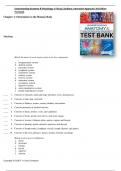Understanding Anatomy & Physiology: A Visual, Auditory, Interactive Approach 3rd Edition
Test Bank
Chapter 1: Orientation to the Human Body
Matching
Match the name of each organ system to its key components.
a. integumentary system
b. skeletal system
c. muscular system
d. lymphatic system
e. respiratory system
f. urinary system
g. nervous system
h. endocrine system
i. circulatory system
j. digestive system
k. male reproductive system
l. female reproductive system
____ 1. Consists of stomach, small and large intestines, liver, and pancreas
____ 2. Consists of skin, hair, and nails
____ 3. Consists of kidneys, ureters, urinary bladder, and urethra
____ 4. Consists primarily of skeletal muscles
____ 5. Consists of heart, arteries, veins, and capillaries
____ 6. Consists of brain, spinal cord, nerves, and sense organs
____ 7. Consists of ovaries, fallopian tubes, uterus, vagina, and breasts
____ 8. Consists of pituitary gland, adrenals, pancreas, and thyroid
____ 9. Consists of lymph nodes, lymphatic vessels, lymph, thymus, and spleen
____ 10. Consists of the nose, pharynx, larynx, trachea, bronchi, and lungs
Match each term to its definition.
a. distal
b. proximal
c. medial
d. lateral
e. superior
f. inferior
Copyright © 2020 F. A. Davis Company
, Understanding Anatomy & Physiology: A Visual, Auditory, Interactive Approach 3rd Edition
Test Bank
g. anterior
h. posterior
i. superficial
j. deep
____ 11. Toward the back of the body
____ 12. Farthest from the point of origin
____ 13. Above
____ 14. At or near the body’s surface
____ 15. Toward the body’s midline
____ 16. Closest to the point of origin
____ 17. Toward the front of the body
____ 18. Below
Match each term to its location on the body.
a. frontal
b. deltoid
c. brachial
d. inguinal
e. pectoral
f. sternal
g. digital
h. antecubital
i. buccal
j. cephalic
k. lumbar
l. calcaneal
m. plantar
n. pedal
o. tarsal
p. axillary
____ 19. Arm
____ 20. Lower back
____ 21. Armpit
____ 22. Heel
____ 23. Fingers
____ 24. Shoulder
____ 25. Sole of the foot
____ 26. Forehead
____ 27. Chest
____ 28. Front of elbow
____ 29. Foot
____ 30. Cheek
Copyright © 2020 F. A. Davis Company
, Understanding Anatomy & Physiology: A Visual, Auditory, Interactive Approach 3rd Edition
Test Bank
____ 31. Groin
____ 32. Ankle
Multiple Choice
Identify the choice that best completes the statement or answers the question.
____ 33. Which organ system produces immune cells and has a role in fluid balance?
a. Integumentary system
b. Circulatory system
c. Endocrine system
d. Lymphatic system
____ 34. Which organ system protects organs, allows for support and movement, and also plays a key role in
blood formation?
a. Circulatory system
b. Muscular system
c. Skeletal system
d. Nervous system
____ 35. Which type of tissue covers the body’s surface?
a. Epithelial
b. Connective
c. Muscle
d. Nerve
____ 36. Bone, cartilage, and adipose tissue are all types of
a. epithelial tissue.
b. connective tissue.
c. muscle.
d. nerve tissue.
____ 37. The type of plane that divides the body horizontally into upper and lower portions is called a
a. sagittal plane.
b. frontal plane.
c. transverse plane.
d. coronal plane.
____ 38. Most illustrations that show the contents of the abdominal cavity use what type of plane?
a. Sagittal
b. Transverse
c. Horizontal
d. Frontal
____ 39. Which of the following correctly describes the anatomical position?
a. Standing erect, facing forward, with arms outstretched
b. Standing erect with arms at sides, palms facing backward, face and feet facing forward
c. Standing erect with arms overhead, face and feet facing forward
d. Standing erect with arms at sides and with palms, face, and feet facing forward
____ 40. The dorsal cavity contains the
a. thoracic and abdominopelvic cavities.
b. cranial and spinal cavities.
c. mediastinum and pleural cavities.
d. abdominal and pelvic cavities.
Copyright © 2020 F. A. Davis Company
, Understanding Anatomy & Physiology: A Visual, Auditory, Interactive Approach 3rd Edition
Test Bank
____ 41. The heart is located in the mediastinum, which is part of what cavity?
a. Thoracic cavity
b. Dorsal cavity
c. Spinal cavity
d. Cranial cavity
____ 42. A patient comes to the hospital for treatment of pain in the right hypochondriac region. Based on the
organs located in that region, which organ might be causing the pain?
a. Stomach
b. Small intestines
c. Gallbladder
d. Appendix
Completion
Complete each statement.
43. The structure of the body is called ____________________; how it functions is called
____________________.
44. The human body is organized from the very ____________________ to the very
____________________.
45. The region proximal to the patellar region and distal to the inguinal region is the
____________________ region.
46. The region superior to the pubic region and inferior to the abdominal region is the
____________________ region.
47. The two major body cavities are the ____________________ and ____________________ cavities.
48. The constancy of the body’s internal environment is called ____________________.
49. ____________________ feedback is when an effector opposes the stimulus and reverses the direction
of change.
50. During childbirth, the hormone oxytocin is released, which causes even greater contractions and an
even greater release of oxytocin. This is an example of ____________________ feedback.
Copyright © 2020 F. A. Davis Company




